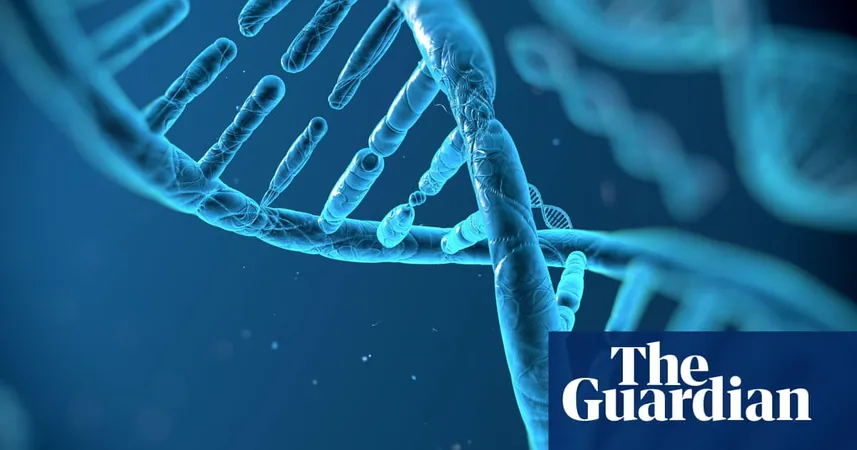
UK Scientists Set to Unravel the Mysteries of DNA with Epic Genome Project
2025-06-26
Author: Ming
A Bold New Frontier in Genetic Research
In a groundbreaking endeavor, researchers in the UK are embarking on an ambitious project aimed at synthesizing the entire human genome from the ground up. This monumental task seeks to unravel the intricacies of DNA and open the door to revolutionary medical therapies.
The Synthetic Human Genome (SynHG) Initiative
Dubbed the Synthetic Human Genome (SynHG) project, this five-year venture will focus on creating long segments of human genetic material in the laboratory. These synthetic DNA sequences will be introduced into living cells, allowing scientists to observe how they function within a biological context.
Radical Therapies on the Horizon
The insights gained from this project promise to pave the way for innovative treatments for various diseases. Imagine living cells designed to resist immune attacks or specific viruses—a game-changer for patients battling autoimmune disorders or chronic viral infections.
"Information derived from synthesizing human genomes could lead to effective therapies for nearly every disease," stated project leader Prof. Jason Chin from the MRC Laboratory of Molecular Biology in Cambridge.
From Reading to Writing: The DNA Challenge
While it's been 25 years since scientists first mapped out the human genome, the tech for deciphering DNA has outpaced efforts to construct it. The initial phases of the SynHG project involve fabricating parts of human chromosomes and testing their functionality in human skin cells, with collaborative efforts from prestigious institutions like Cambridge, Oxford, and Imperial College London.
Decoding the 'Dark Matter' of the Genome
Chin's team previously achieved the remarkable feat of synthesizing the complete genome of E. coli. In contrast to the bacteria's 4.5 million base pairs, the human genome boasts a staggering 3 billion base pairs. As Dr. Julian Sale from LMB noted, "The human genome is more than just a string of genes; it contains vast regions—often dubbed the 'dark matter' of the genome—whose functions remain elusive. Successfully building genomes will help us understand these mysteries."
Ethical Implications and Social Responsibilities
Alongside the scientific quest, researchers are also grappling with the ethical dimensions of genome synthesis. Prof. Joy Zhang from the University of Kent leads a parallel exploration into the societal implications of laboratory-created genomes. Sale emphasized, "While we are still a ways from tangible therapies, now is the perfect moment to discuss what we want, and what we wish to avoid."
Potential Breakthroughs and Ethical Dilemmas
Prof. Iain Brassington from the University of Manchester highlighted the potential for creating synthetic mitochondria—tiny energy-producing structures. This innovation could prevent women with mitochondrial diseases from passing them onto their offspring, alleviating the burden of donor eggs required for IVF procedures.
However, the technology carries risks. Brassington warned that synthetic bacteria could inadvertently disrupt ecosystems if not managed carefully. Meanwhile, the specter of 'designer babies' raises ethical questions on parental control over genetic traits. He even suggested the wild scenario of celebrities 'licensing' parts of their genomes for others to replicate.
Looking Ahead: The Future of Genetic Engineering
Despite the concerns surrounding genomics, Brassington maintained, "Many worries about designer babies are based on theoretical technologies. I won't lose too much sleep over them." As the SynHG project unfolds, it sets the stage for a new chapter in genetics, one filled with both promise and caution.




 Brasil (PT)
Brasil (PT)
 Canada (EN)
Canada (EN)
 Chile (ES)
Chile (ES)
 Česko (CS)
Česko (CS)
 대한민국 (KO)
대한민국 (KO)
 España (ES)
España (ES)
 France (FR)
France (FR)
 Hong Kong (EN)
Hong Kong (EN)
 Italia (IT)
Italia (IT)
 日本 (JA)
日本 (JA)
 Magyarország (HU)
Magyarország (HU)
 Norge (NO)
Norge (NO)
 Polska (PL)
Polska (PL)
 Schweiz (DE)
Schweiz (DE)
 Singapore (EN)
Singapore (EN)
 Sverige (SV)
Sverige (SV)
 Suomi (FI)
Suomi (FI)
 Türkiye (TR)
Türkiye (TR)
 الإمارات العربية المتحدة (AR)
الإمارات العربية المتحدة (AR)